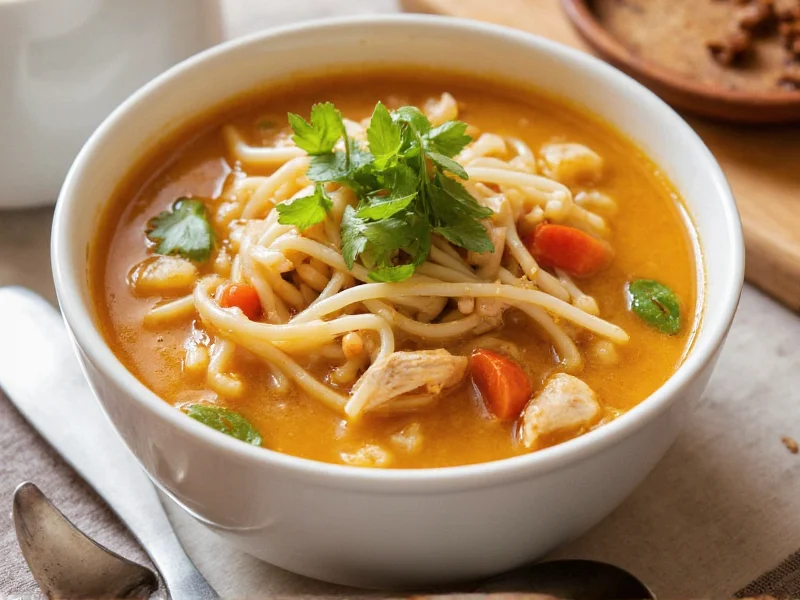For generations, chicken noodle soup has been cherished as both nourishment and comfort. This timeless dish transcends cultural boundaries, appearing in variations across continents while maintaining its core identity as a healing, satisfying meal. Whether you're fighting off a cold or simply craving warmth, understanding the elements that create exceptional chicken noodle soup transforms this simple dish into something extraordinary.
The Essential Components of Authentic Chicken Noodle Soup
Creating remarkable chicken noodle soup requires attention to three critical elements: the broth, the chicken, and the noodles. Many home cooks underestimate how these components interact to create the final flavor profile.
Professional chefs emphasize that the broth forms the soul of the soup. While store-bought broths offer convenience, simmering chicken bones with aromatic vegetables for 2-3 hours extracts collagen that gives homemade chicken noodle soup its characteristic richness and body. The addition of herbs like thyme, parsley stems, and a bay leaf during simmering creates complex flavor layers that instant broths cannot replicate.
Step-by-Step Preparation Guide
Follow this method for restaurant-quality chicken noodle soup at home:
- Build your foundation: Start with 2 pounds of chicken bones (backs, necks, or wings) in a large pot. Cover with 8 cups of cold water and bring to a gentle simmer.
- Skim impurities: As the broth heats, foam will rise to the surface. Carefully skim this off for a clearer broth.
- Add aromatics: After 20 minutes of simmering, add 1 chopped onion, 2 celery stalks, 2 carrots, and herb bundle (parsley stems, thyme, bay leaf).
- Simmer patiently: Maintain a gentle simmer for 2-3 hours, never allowing the broth to boil vigorously.
- Strain and clarify: Remove solids through a fine-mesh strainer, pressing gently to extract all liquid.
- Prepare chicken: Simmer 1 pound boneless chicken breasts in the strained broth until cooked through, then shred.
- Cook noodles separately: Boil egg noodles until al dente, then rinse under cold water to prevent overcooking in the soup.
- Final assembly: Combine broth, shredded chicken, cooked vegetables, and noodles just before serving.
Avoiding Common Chicken Noodle Soup Mistakes
Even experienced cooks make these frequent errors when preparing homemade chicken noodle soup:
| Mistake | Consequence | Solution |
|---|---|---|
| Boiling broth vigorously | Cloudy, bitter broth | Maintain gentle simmer (small bubbles barely breaking surface) |
| Adding noodles directly to soup | Mushy noodles, thickened broth | Cook noodles separately and add just before serving |
| Overcooking vegetables | Mushy texture, lost nutrients | Add delicate vegetables in last 10-15 minutes of cooking |
| Using only breast meat | Bland, dry chicken | Incorporate bone-in pieces for richer flavor |
Regional Variations Worth Exploring
Chicken noodle soup adapts beautifully to regional preferences while maintaining its comforting essence:
- Ashkenazi Jewish tradition: Features wide egg noodles (lokshen) and often includes schmaltz (rendered chicken fat) for enhanced flavor
- Chinese variation: Uses wheat noodles with ginger-infused broth and bok choy instead of Western vegetables
- Middle Eastern adaptation: Incorporates turmeric and lemon for a golden-hued, tangy version
- Latin American style: Features small pasta shapes like fideo and often includes potatoes
Health Benefits Beyond Comfort
Scientific research supports what grandmothers have long claimed about chicken noodle soup's healing properties. The steam helps clear nasal passages, while the warm liquid promotes hydration. More significantly, studies published in the journal Chest indicate that chicken soup may have mild anti-inflammatory effects that help reduce symptoms of upper respiratory infections.
The vegetables provide essential vitamins, while the protein from chicken supports immune function. For those seeking a healthier version of traditional chicken noodle soup, substituting whole wheat noodles increases fiber content without compromising the comforting texture.
Perfect Pairings and Presentation
Elevate your homemade chicken noodle soup experience with these finishing touches:
- Add fresh parsley or dill just before serving for brightness
- Squeeze of lemon juice enhances flavor complexity
- Crusty bread or crackers provide satisfying texture contrast
- Serve in pre-warmed bowls to maintain optimal temperature
When preparing chicken noodle soup for someone who's ill, consider making smaller portions with extra broth and fewer noodles, as digestive systems may be sensitive. The ideal chicken noodle soup for colds balances hydration with gentle nourishment.
Frequently Asked Questions
Can I make chicken noodle soup without meat for a vegetarian version?
Yes, create a rich vegetarian chicken noodle soup by using mushroom stems, dried seaweed, and nutritional yeast to mimic umami flavors. Simmer these with traditional mirepoix vegetables for 45 minutes, then strain before adding cooked noodles and fresh vegetables.
How long does homemade chicken noodle soup stay fresh in the refrigerator?
Properly stored in an airtight container, homemade chicken noodle soup remains fresh for 3-4 days in the refrigerator. For best results, store noodles separately from broth to prevent them from becoming mushy when reheated.
What's the secret to preventing noodles from absorbing all the broth?
The key to maintaining perfect broth-to-noodle ratio is cooking noodles separately and adding them to individual portions rather than the entire batch. This technique works especially well for meal prep versions of easy chicken noodle soup with vegetables.
Which noodle type works best for traditional chicken noodle soup?
Egg noodles provide the classic texture and flavor for traditional chicken noodle soup. Medium-width ribbons hold up well in broth without becoming mushy. For gluten-free options, rice noodles or quinoa pasta work well when added at the very end of cooking.
Can I freeze chicken noodle soup successfully?
Yes, but freeze broth and solids separately from noodles. The soup base freezes beautifully for up to 3 months. Cook fresh noodles when reheating to maintain ideal texture in your frozen chicken noodle soup portions.











 浙公网安备
33010002000092号
浙公网安备
33010002000092号 浙B2-20120091-4
浙B2-20120091-4